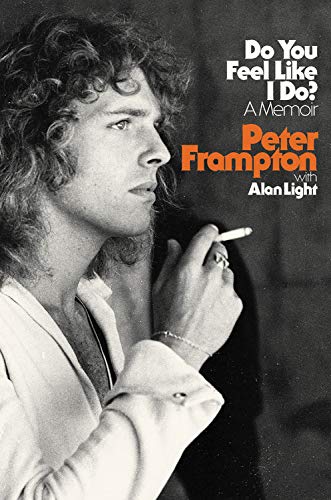
Guide to British Music of the 1960s
November 2020
Book Review
Do You Feel Like I Do by Peter Frampton with Alan Light

Peter Frampton released what was, at that point, the biggest-selling LP in history with the double live album Frampton Comes Alive. During the second half of the 1970s it seemed that Peter Frampton could do no wrong. The money rolled in from record sales, writing and publishing although it didn't. While it certainly made him wealthy, Frampton came up with the often heard story of his true earnings not reaching him, often lining the pockets of managers, accountants and assorted hangers-on.
Peter Frampton's musical story started in the 1960s. He had been at school with Davie Jones (later David Bowie) and he crops up often in the book as a good friend (Dave). He was a member of Jones' first group the Konrads and went through several bands before joining an existing band the Herd. Although he joined as guitarist he was quickly pushed forwards as the singer probably as much for his good looks - he was known as the Face of '68 - as for his singing. This is an ongoing theme throughout the book as he preferred to be seen as a guitarist or musician rather than a lead singer and certainly not the pretty boy up front.
Peter Frampton was born in 1950, a few years later than many of the artists that made it big in the 1960s. He appears to have been more influenced by the Shadows than by the early rock & roll artists. This also meant that throughout his career he seemed to be somewhat in awe of other artists even when he was playing with them or meeting them. This included the Beatles though he played with George and Ringo, Hank Marvin and, even as late as 2019, Eric Clapton. Mind you, these artists also held Frampton in high regard!
Frampton Comes Alive appears to have acted like a millstone around his neck. It was ubiquitous and he semi-quotes Wayne's World - "If you lived in the suburbs you were issued this." As a live album it took several years to write as the songs were issued on previous albums and this was the recording of a live concert (or several). However, always after the next dollar, record companies and the like were looking for repeat business along these lines. He did not want to follow it with another live album as the songs took years to write.
A major influence on Frampton's career was Steve Marriott. They were both in the awkward position of being teen idols when they saw themselves as serious musicians. Trying to play music when girls are screaming and trying to get at you became very tiring and frustrating. It is generally known that Marriott wanted Peter Frampton to join the Small Faces as lead guitarist so he could concentrate on his singing but other band members objected as they were not consulted. However, he did join the Small Faces to play alongside them as part of the Paris sessions for French singer Johnny Halliday. Shortly after this, they teamed up in Humble Pie and took their music in a whole new direction. It is Humble Pie that cracked the US for Frampton. They gained a huge following by supporting major acts and this gave them a massive audience when they went out on their own. Again a live album was a massive breakthrough although Frampton departed just before Rock the Fillmore was released. He does tell the story about how I Don't Need No Doctor was written during the soundcheck and debuted the same evening at the gig. Steve Marriott reappears later in the story as they started recording together again until Marriott died in a house fire. Fortunately those tracks are now available for everyone to listen to.
This is a very enjoyable book to read. Peter Frampton's dedication to the guitar is obvious and the story of his Gibson Les Paul Phenix is fascinating. There is so much more to Peter Frampton than Frampton Comes Alive and it makes the reader want to explore Frampton's other work such as the blues and instrumental albums. He has stopped recording and touring now due to illness but there is a wealth of material there to be discovered.
Published: November 2020
Hachette